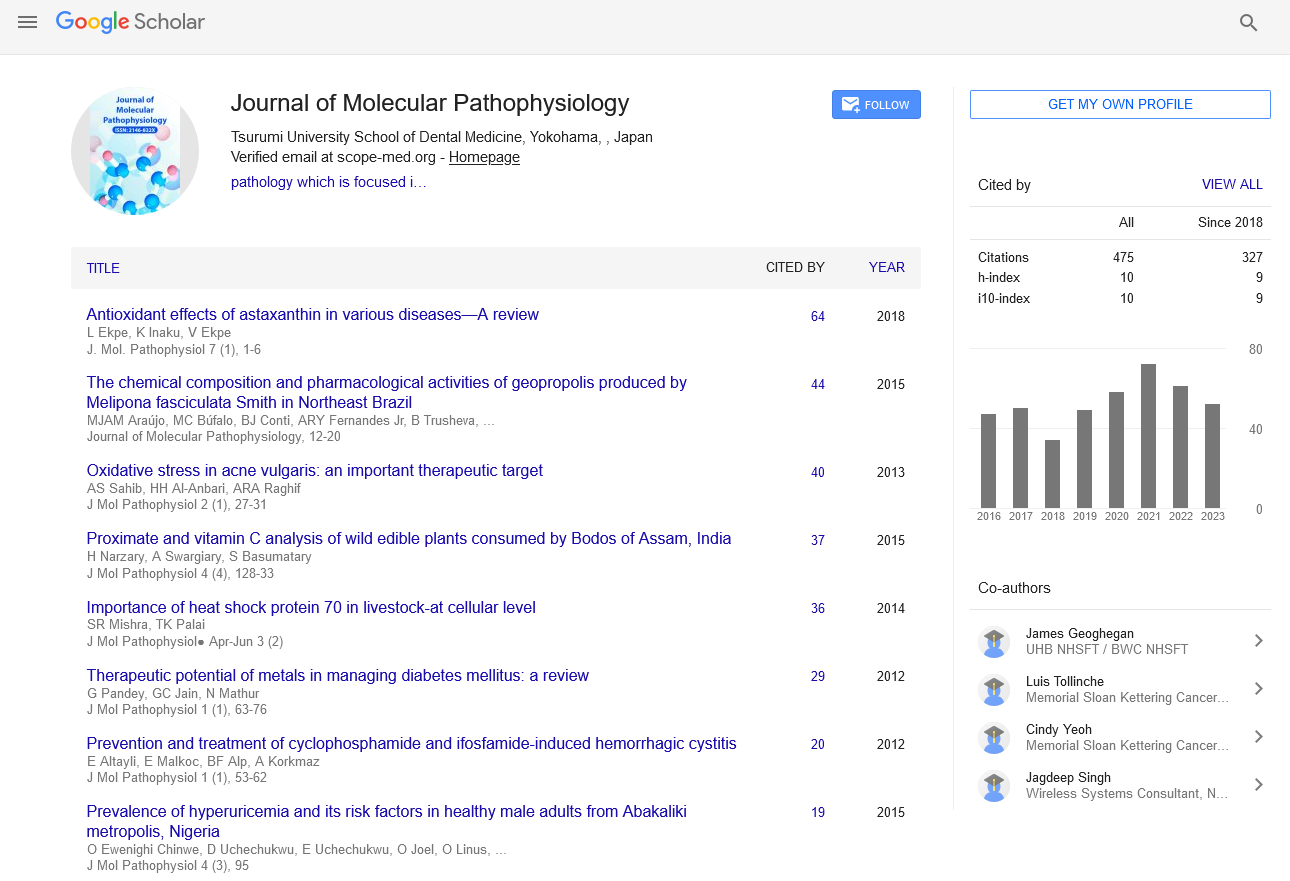Perspective - Journal of Molecular Pathophysiology (2023)
The Essential Role of Pediatric Pathology in Children\'s Healthcare
Hui Wu*Hui Wu, Department of Pediatrics, University of Amsterdam, Amsterdam, Netherlands, Email: Wuhui909@yahoo.com
Received: 18-Apr-2023, Manuscript No. JMOLPAT-23-98068; Editor assigned: 21-Apr-2023, Pre QC No. JMOLPAT-23-98068 (PQ); Reviewed: 08-May-2023, QC No. JMOLPAT-23-98068; Revised: 15-May-2023, Manuscript No. JMOLPAT-23-98068 (R); Published: 22-May-2023
About the Study
Pediatric pathology is a medical subspecialty that deals with the diagnosis and treatment of diseases and conditions that affect infants, children, and adolescents. This field is essential because children have unique medical needs and require specialized care. Pediatric pathology involves the study of the causes, mechanisms, and outcomes of diseases that affect children, including genetic, developmental, and acquired disorders.
Pediatric pathology encompasses a broad range of conditions, from congenital anomalies to infectious diseases, and from benign tumours to malignancies. The pathologist’s primary role is to analyze tissue samples obtained from patients through biopsies, autopsies, and other diagnostic procedures. They use advanced laboratory techniques to identify and characterize the disease or condition and provide accurate diagnoses and treatment recommendations.
One of the key differences between Pediatric pathology and adult pathology is the unique developmental changes that occur in children. Children’s tissues and organs undergo rapid growth and development, and this can lead to differences in the presentation and progression of diseases. For example, certain genetic disorders may present differently in children than in adults due to differences in growth and development. Additionally, Pediatric pathologists must consider the impact of treatment on a child’s growth and development when making treatment recommendations.
Pediatric pathologists work closely with other healthcare professionals, including pediatricians, neonatologists, oncologists, and surgeons. They provide critical diagnostic information that helps guide patient management and treatment decisions. For example, Pediatric pathologists play a critical role in the diagnosis and management of childhood cancers. They analyze tissue samples to determine the type and stage of cancer, which helps guide treatment decisions. Pediatric pathology also involves the study of developmental disorders that affect children. These conditions can be genetic or acquired and can impact a child’s growth, development, and overall health. Examples of developmental disorders that Pediatric pathologists study include congenital heart defects, neural tube defects, and Down syndrome.
Infectious diseases are another area of focus in Pediatric pathology. Children are particularly susceptible to infectious diseases due to their underdeveloped immune systems. Pediatric pathologists play a critical role in diagnosing and managing infectious diseases in children. They use advanced laboratory techniques to identify the causative agent of the infection and determine the appropriate treatment. Another important area of pediatric pathology is the study of pediatric tumours. Pediatric tumours can be benign or malignant and can occur in any part of the body. Pediatric pathologists analyze tissue samples to determine the type of tumor and its stage, which helps guide treatment decisions. They also work closely with other healthcare professionals, including pediatric oncologists, to develop individualized treatment plans for children with cancer.
Pediatric pathology also involves the study of metabolic disorders, which are genetic conditions that affect the body’s ability to process nutrients. These disorders can cause a wide range of symptoms, from mild to severe, and can impact a child’s growth and development. In addition to diagnosing and managing diseases and conditions, pediatric pathologists also play a critical role in research. They study the underlying mechanisms of diseases and conditions that affect children, which can lead to the development of new treatments and therapies. Pediatric pathologists also study the impact of treatments on a child’s growth and development, which helps guide treatment decisions.
Pediatric pathology is a vital subspecialty of medicine that deals with the diagnosis and treatment of diseases and conditions that affect children. Pediatric pathologists play a critical role in providing accurate diagnoses, guiding treatment decisions, and conducting research to improve outcomes for children with medical conditions. Their work is essential in ensuring that children receive the specialized care they need to grow and develop into healthy adults.
Copyright: © 2023 The Authors. This is an open access article under the terms of the Creative Commons Attribution Non Commercial Share Alike 4.0 (https://creativecommons.org/licenses/by-nc-sa/4.0/). This is an open access article distributed under the terms of the Creative Commons Attribution License, which permits unrestricted use, distribution, and reproduction in any medium, provided the original work is properly cited.







